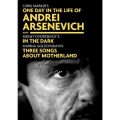| Reviews & Columns |
|
Reviews DVD TV on DVD Blu-ray 4K UHD International DVDs In Theaters Reviews by Studio Video Games Features Collector Series DVDs Easter Egg Database Interviews DVD Talk Radio Feature Articles Columns Anime Talk DVD Savant Horror DVDs The M.O.D. Squad Art House HD Talk Silent DVD
|
DVD Talk Forum |
|
|
| Resources |
|
DVD Price Search Customer Service #'s RCE Info Links |
|
Columns
|
|
|
One Day in the Life of Andrei Arsenevich
THE MOVIE:
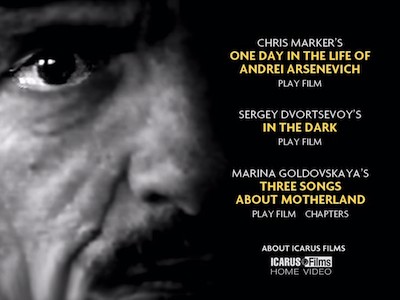
Though the marquee film on the DVD is the titular One Day in the Life of Andrei Arsenevich, the package released by Icarus Films, and seemingly curated by filmmaker Chris Marker, is a triptych. The three short pieces collected here form one program, examining Russian filmmaking past and present, and with it, the evolving Russian identity.
That said, the lead movie is, indeed, Chris Marker's One Day in the Life of Andrei Arsenevich (55 minutes), a 1999 segment of the French television series Cinéastes de notre temps (a.k.a. "Filmmakers of our time") highlighting the cinema of Andrei Tarkovsky. Marker, a well-known moviemaker in his own right (La Jetee, Sans Soleil), uses footage of Tarkovsky's son, who had previously been unable to leave Russia, visiting his father on his deathbed in Italy. Tarkovsky had only just recently completed his last film, The Sacrifice, and the finality of that movie's narrative spoke to Marker as a prescient fulfillment of the themes presented in the great director's prior efforts. To explain this, Marker uses both on-set footage from The Sacrifice's final scene and clips from the man's seven features (and one student film), exploring how the meticulous artist made his vision come alive and the large philosophical fabric that connects the opening shot of his first film, Ivan' Childhood, to the conclusion of The Sacrifice.
One Day in the Life of Andrei Arsenevich is a tribute to one singular filmmaker made by another. It is at once both an extension of the subject and of the architect, reflecting both on Tarkovsky and on Marker equally, and perhaps giving us some insight into how the former maybe influenced the latter. The material is narrated by Alexandra Stewart, quietly relating carefully chosen connectors, pointing out the repetition of images and ideas in Tarkovsky's efforts. It's one of the most illuminating dissections of an oft-debated, difficult filmmaker that I've come across, all the better for using cinema to teach about the art form--and well worth seeking out for fans of either of these gentlemen.

The second selection is a 2004 documentary from Sergey Dvorstevoy (Tulpan) entitled In the Dark (41 minutes). This sparse feature mostly takes place in a small Moscow apartment, watching an elderly blind man struggle with his cat and his purpose in life. The snow-white cat keeps knocking things over and stealing balls of string, and the ongoing skirmishes between companion and owner should be familiar to anyone who has pets--it can be a genuine love and hate relationship, as we particularly see in the final scenes of In the Dark. The old man thrives on the never-ending back and forth, he loves the eternal conflict. It keeps him alive.
So does his habit of taking the string that cat is after and making hand-woven bags out of it. The blind man spends his days indoors listening to the children play down below his window, twisting thread into handy carriers. The camera then follows him out into the street where he intends to hand them out for free. Only, every passerby already has a bag, some fancy decorated thing from wherever they just did their shopping. They all refuse these gangly looking creations, and one person even tells the old man that they are out of date. The implication is that he is, too, an unnecessary appendage that keeps slapping at the universe. Indeed, we see him the following winter carrying on, making more bags.
We also see the old man in tears following his failed expedition. It's an awkward moment, and seemingly ashamed, the cameraman turns his lens elsewhere. Now instead of hearing the sounds from outside while we are inside, we now listen to the interior pain and peer out the window at an exterior that is no less sad--a high rise tenement that boxes people in and forgets about them. It feels like we have stepped over some line here, broken the wall between distanced documentarian and subject, and thus between the viewer and the film, as well. This happens throughout In the Dark, the two-person crew keeps reaching in to help pick up papers or untangle string. But how could they not? It's all well and good in theory to stay out of it, to just passively watch, dismissing the pain when it gets too close for comfort just like the people on the street who refuse the bags, but then what would that make us?
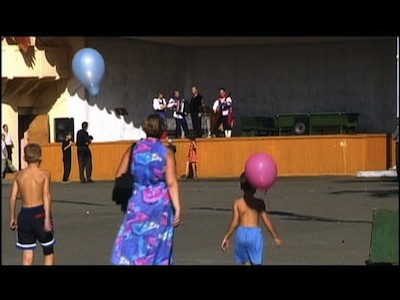
The last film, Three Songs About Motherland (2008; 39 minutes), from veteran documentarian Marina Goldovskaya is, as the title suggests, a triptych of its own. The piece is broken into three segments, each looking at a different Russian community: a poor working town in the East, a bustling metropolis, and a thriving settlement in Siberia. The first, Komsomolsk-on-Amur, is represented through testimonies by senior citizens who immigrated to the area and built it from the ground up under the Communists. Now, they have conflicting views of the origins and the treatment at the hands of the government that sent them to this remote outpost. (And their high-rise homes look a lot like the one in In the Dark.)
The second chapter is set in Moscow and splices together interviews pat and present from Anna Politkovskaya, a crusading journalist who was murdered because of her articles about the Chechen conflicts. Goldovskaya was talking to her in the time just before her death, and contrasted with the older citizenry's distrust of the government in the previous section, it suggests certain chilling implications about life under Putin. (His press conference about Politkovskaya's death is unnervingly disingenuous.) This is further contrasted by the last segment, which looks at Khanty-Mansijsk, an oil town. Juxaposed with Politkovskaya's death is the image of a successful television journalist on the local television news. In terms of modern living, Khanty-Mansijsk is burgeoning, and the system there actually seems to favor the workers. In three short steps, we have come so far from the introductory struggles, it's kind of astonishing, but Goldovskaya ties it all together using mournful ballads from singer Élena Kamburova, who performs on camera, suggesting that despite the differences, all of Russia is united by one cultural tapestry.
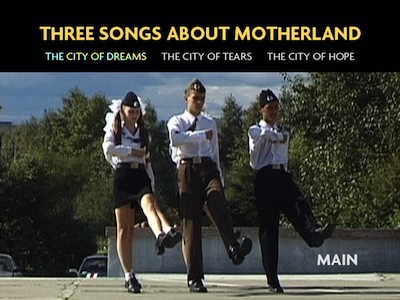
THE DVD
Video:
One Day in the Life of Andrei Arsenevich is a full-frame presentation, maintaining the aspect ratio of the television broadcast. The source appears to have been a bit dilapidated, the colors are a tad bit faded and there is regular combing throughout. Granted, in the case of the film clips, Marker had to make due with what was available to him more than ten years ago, and television production of the time wasn't very high end either, so it is likely fine for what it is. None of the interlacing or other issues obscure the viewing. Three Songs is similar, especially in some of its early video sources, but that film and In the Dark are clean and clear.
Sound:
All of the programs are presented in basic stereo, and the mixes sound fine. The audio is clear and reflects the natural setting without distortion or messy noise. Subtitles are automatic.
Extras:
Chris Marker provides liner notes for the back cover of the DVD, explaining his interpretation of the films and how he sees them relating to one another.
FINAL THOUGHTS:
Recommended. One Day in the Life of Andrei Arsenevich is an interesting, off-the-beaten-path collection of three separate documentaries about Russia, ranging from Chris Marker's portrait of Soviet filmmaker Andrei Tarkovsky to stories about the common man and the not-so-common crusader. All have a reverential timbre, respecting facts above slick editorializing. Definitely a fascinating viewing experience.
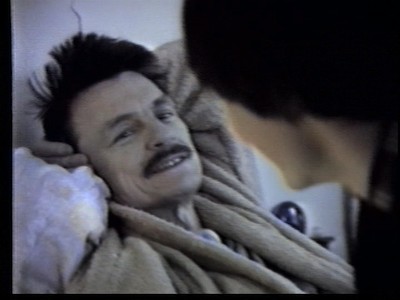
Jamie S. Rich is a novelist and comic book writer. He is best known for his collaborations with Joelle Jones, including the hardboiled crime comic book You Have Killed Me, the challenging romance 12 Reasons Why I Love Her, and the 2007 prose novel Have You Seen the Horizon Lately?, for which Jones did the cover. All three were published by Oni Press. His most recent projects include the futuristic romance A Boy and a Girl with Natalie Nourigat; Archer Coe and the Thousand Natural Shocks, a loopy crime tale drawn by Dan Christensen; and the horror miniseries Madame Frankenstein, a collaboration with Megan Levens. Follow Rich's blog at Confessions123.com.
|
| Popular Reviews |
| Sponsored Links |
|
|
| Sponsored Links |
|
|
| Release List | Reviews | Shop | Newsletter | Forum | DVD Giveaways | Blu-Ray | Advertise |
|
Copyright 2024 DVDTalk.com All Rights Reserved. Legal Info, Privacy Policy, Terms of Use,
Manage Preferences,
Your Privacy Choices | |||||||









